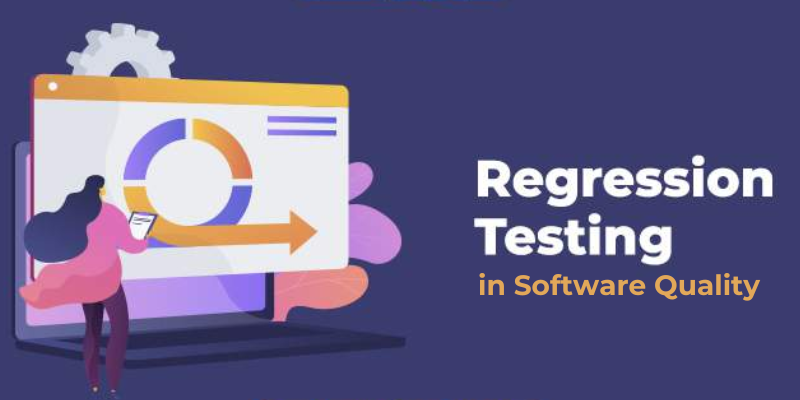Regression testing is crucial in ensuring software quality by verifying that recent code changes do not negatively impact existing functionality. It helps maintain stability, detect new defects, and confirm that updates or bug fixes do not introduce issues. By rerunning previous test cases, regression testing ensures the software remains reliable after modifications. This method plays a vital role in delivering high-quality software products. Join the Software Testing Course in Gurgaon, which provides the skills to excel in manual and automated testing.
Exploring Regression Testing in Software Development
Regression testing is essential for upholding software quality by verifying that new code changes do not introduce issues. It ensures that the existing functionality remains unaffected by recent updates or modifications. Whenever modifications, such as feature additions, bug fixes, or updates, are made to the software, there is a possibility of unintended side effects. Regression testing is designed to verify that these changes do not introduce new defects into previously tested and functional areas of the application. This type of testing involves rerunning test cases that were previously executed to confirm the stability and correctness of the software after modifications.
Preventing Defects from Spreading
One of the primary functions of regression testing is to prevent defects from spreading across the software. Software updates and code changes often have dependencies that, if not properly checked, can affect other parts of the application. Regression testing systematically identifies these potential defects by rechecking the parts of the software that might be impacted by the changes. It serves as a safety net, helping developers detect and resolve issues early, preventing them from progressing to later stages of development or deployment where they could cause more significant problems. Enrolling in Software Testing Courses in Kolkata is vital for establishing a successful career.
Facilitating Continuous Integration
In environments that use continuous integration (CI) practices, regression testing is essential for maintaining software quality throughout the development process. CI involves frequent code changes and automated builds, which can introduce new bugs into the system. Automated regression testing integrates seamlessly into CI pipelines, allowing for quick detection of any issues that arise from code changes. By running tests automatically with every new build, developers can ensure that the software remains functional and stable as new features and updates are added.
Ensuring Compatibility with New Features
When new features are added to an existing software product, they often interact with or depend on other parts of the system. Regression testing ensures that these new features are compatible with the existing codebase and do not introduce conflicts. It verifies that the new functionality works as intended while ensuring that the previously developed features continue to function properly. This type of testing also helps in identifying integration issues that might occur when merging new features into the system.
Improving Software Reliability
Software reliability is crucial for user satisfaction and overall product success. Regression testing contributes to this by maintaining a high level of confidence in the system’s performance. By continuously testing the application after each change, developers can ensure that it performs consistently, reducing the likelihood of unexpected failures in production. This proactive approach helps to deliver a reliable, high-quality software product that users can depend on for their needs. Enrolling in a Software Testing Course in Delhi enables individuals to develop the skills to choose the right tools for software testing.
Reducing Risk in Software Releases
Frequent software releases can introduce risks, especially when changes are made to critical components of the system. Regression testing helps mitigate these risks by thoroughly checking the software for any adverse effects of code changes. This minimises the possibility of releasing software with undetected bugs or broken functionality. With regression testing in place, teams can confidently release updates and new features, knowing that the risk of introducing significant issues has been reduced.
Enhancing Test Coverage
Regression testing also enhances test coverage by ensuring that previously tested parts of the software are revalidated after changes. It builds on the foundation of earlier testing efforts and expands the coverage to include areas affected by new code changes. This comprehensive approach ensures that the software is continuously monitored for defects, even in areas that might not be directly impacted by the changes. This broader test coverage contributes to a more stable and robust product.
Facilitating Faster Debugging
When issues are identified through regression testing, it becomes easier for developers to debug and resolve them. Because regression tests focus on areas of the code that were previously functioning, developers can narrow down the root cause of the defect more quickly. By pinpointing the source of the issue, teams can reduce the time spent on debugging and fixing the software, leading to faster development cycles and more efficient problem resolution. Enroll in the Software Testing Courses in Ahmedabad to delve deeper into Software Testing concepts.
Supporting Automation in Testing
Automation plays a significant role in making regression testing more efficient. Since regression tests are often repetitive and need to be executed frequently. Automating them reduces the effort and time required for manual testing. Automated regression tests can be run on different platforms, environments, and configurations. This ensures that the software performs well under various conditions. The scalability of automated regression testing allows teams to focus on other critical areas of development. This ensures that high software quality is maintained.
Maintaining Customer Satisfaction
Ultimately, regression testing plays a vital role in maintaining customer satisfaction. By ensuring that the software performs as expected after every update or change, developers can deliver a smooth, uninterrupted user experience. Software that functions reliably over time builds trust with users, leading to greater satisfaction and loyalty. With regression testing in place, teams can avoid disruptions in service, prevent negative feedback, and uphold the reputation of the product.
Regression testing is essential for maintaining software quality by ensuring that updates and changes do not compromise existing functionality. It helps prevent new defects, improves reliability, and supports continuous development. By integrating regression testing, teams can deliver stable and high-performing software. Explore the Software Testing Course in Jaipur, which aids in acquiring knowledge about utilising AI in software testing.
Also Check: Software Testing Interview Questions and Answers


